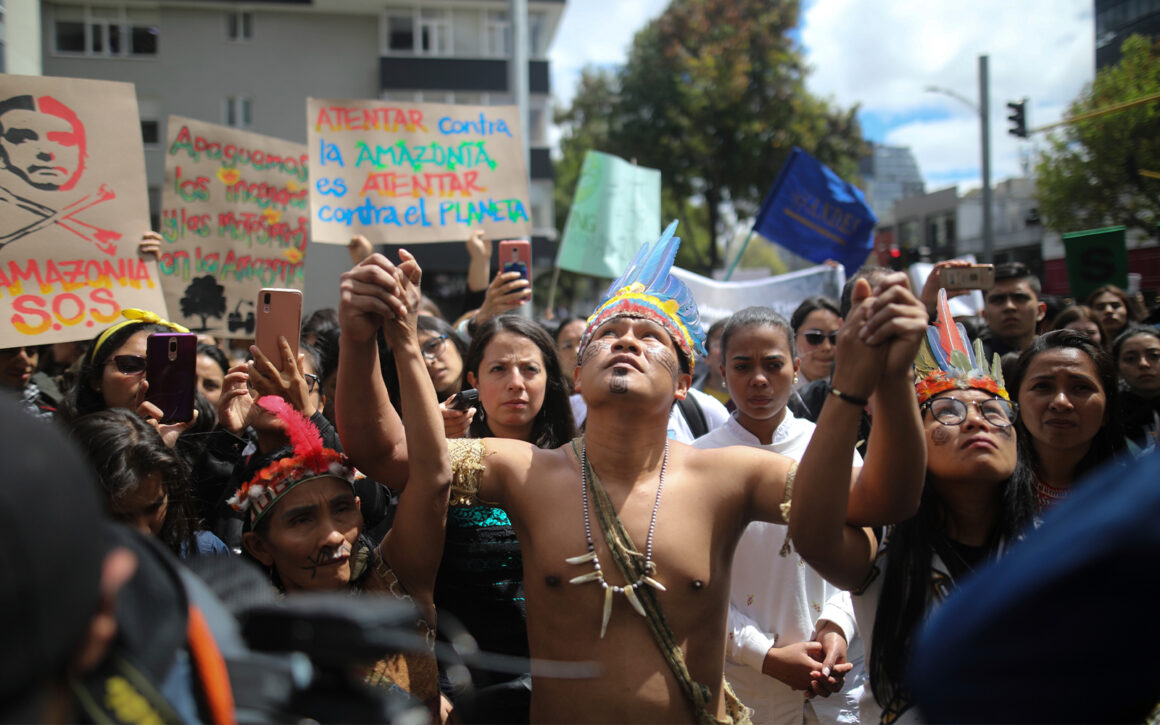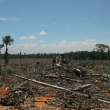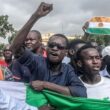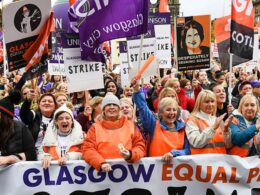By Pedro Meade and Ana Vitoria, Liberdade, Socialismo e Revolução (our sister organisation in Brazil)
As we are seeing, climate crises are intensifying. Wildfires of unprecedented proportions are raging in Canada, there are historic droughts in Argentina, and increasingly severe storms are causing flooding and landslides throughout the Latin American region. The Americas and the world are increasingly feeling the effects of this crisis, but while politicians make empty gestures, government-backed multinational corporations accelerate their quest for more natural resources, exploiting and devastating nature and oppressing all who threaten their profit motive. On the front lines of resistance against this devastation are activists, environmentalists, indigenous peoples and communities who confront the brutal violence of the system by defending their homes and the environment, often paying with their lives.
More than a year has passed since Brazilian indigenist Bruno Pereira and British journalist Dom Philips were executed in the Vale do Javari region of Amazonas state in Brazil. They were investigating illegal fishing in the country’s second largest indigenous territory when they were shot in the back, dismembered, burned and buried. Their deaths recalled the cases of rubber tapper Chico Mendes, murdered in the backyard of his home in 1988, and Dorothy Stang, a nun and Amazonian defender murdered in 2005, which had international repercussions. But unfortunately these cases are not exceptions.
Violent plunder of natural resources
Latin America is the most dangerous region for environmental activists. This according to the 2021 Global Witness report which shows that of the 10 most lethal countries, 7 are in the continent with 3 out of 4 attacks occurring in the region. In recent years, Mexico, Colombia and Brazil, along with the Philippines, vie for the title of being the country with the highest number of deaths of land defenders. These numbers certainly suffer from underreporting, but the violence itself prevents us from having more accurate numbers due to intimidation, censorship and threats that make reporting difficult.
What is behind this violence is mainly the market strategists who work with raw materials such as timber exports, mineral exploration and commodities. The market for raw materials, whether clandestine or legal, is enormously lucrative. Since colonization, Latin America has been seen as a continent to be exploited for all its natural and human resources in the name of capitalist enrichment. Today, this practice generates billions of dollars for companies that do everything possible to get out of the way of anything that might threaten their profits.
Armed groups, criminal organizations and even state forces use lethal violence to silence any resistance. Often, the threat of violence alone is enough to keep environmental defenders silent, threatening their families or even entire communities. Sexual violence is used against women as a brutal form of violence against those who fight back. This violence is facilitated by governments that ignore these cases, often seen as remote and isolated, or actively use state force against activists and communities. Up to 95% of killings do not result in prosecution. And where there are any convictions, most often it is only those who pulled the trigger but almost never the masterminds or sponsors of the crime.
Indigenous people bear the brunt
A disproportionate number of these attacks target indigenous populations, and one-third of all fatal attacks are against them, despite the fact that they make up only 5% of the world’s population. Most of the massacres in the countryside are also against these native populations, in addition to being more impacted by the additional problems of exploitation.
In Brazil, the most emblematic recent case of this was the crisis of the Yanomami people, who saw their lands invaded by an army of miners in search of gold, encouraged by the high price of gold and with the endorsement of then President Bolsonaro. These operations were heavily financed with bulldozers, airplanes and barges used for extraction. The mercury used in the process polluted rivers and generated several social crises in the indigenous communities, wiping out the fish population and generating spikes in malaria and malnutrition crises, in addition to the physical violence used by the gold miners against them. The financing of these operations and the fate of the gold revealed the hand of large companies operating in this market together with politicians and organized crime.
Deforestation and land grabbing, often involving forest fires, are used to make room for agribusiness. Pastures for cattle ranching or huge “green deserts” of monocultures such as soybeans, corn and eucalyptus, wipe out the area’s biodiversity and drive out communities. The majority of ecosystem defenders, 70%, defended the forests from this devastation. In Brazil and Peru, three quarters of the recorded attacks occurred in the Amazon region.
In Chile, the Mapuche people are still resisting in the south of the country, fighting for their ancestral lands, which are now being used by “forestry” companies for eucalyptus plantations and other monocultures. In the conflicts, armed groups of the Mapuche people have used sabotage tactics such as burning plantations in an attempt to evict these companies. Gabriel Boric’s government has again extended the state of emergency in the region, the poorest in the country, using the armed forces to contain the Mapuche. Even with the government’s promises to be more inclusive, especially on the indigenous issue, community leaders continue to be arbitrarily arrested and political prisoners have not yet been released.
In Colombia, violence was classified by the UN in 2020 as endemic with paramilitary and organized crime groups competing for control of areas and their natural resources. Indigenous territories are particularly vulnerable, as indigenous peoples and people of color are the target of one-third of attacks. In addition, companies pollute ecosystems, wiping out entire communities, as in the case of the French company Veolia, owner of a giant landfill in the San Silvestre region that is contaminating rivers and soil. Paramilitary groups were used to threaten those who tried to denounce the company.
New “progressive” governments fail to fight back
Cases like these are widespread throughout the region and are part of the daily reality of many communities. During right-wing governments like Bolsonaro’s in Brazil, this violence increased at the same time that protections were dismantled. But the new “progressive” governments in the region are unable to put an end to the violence. These governments have quickly entered into crisis and have made compromises with the bourgeois classes that have a direct interest in this violence. It is enough to see how the Lula government in Brazil did not take 6 months to feel the pressure of the agribusiness interests that are trying to empty the ministries of environment and indigenous peoples. In other cases, such as the Obrador government in Mexico, state force is used to contain resistance against companies that are taking water away from entire communities.
We cannot rely on institutions to resolve this cycle of destruction and violence. Examples such as the most combative layers of the indigenous movement taking the struggle to the streets or the National Assemblies for Water and Life in Mexico trying to bring communities together and coordinate the struggle show the way. But, as long as the struggles are seen as rural or environmental issues, isolated from a broader struggle against the system that perpetuates this barbarism, these struggles will be limited.
Mass movement against capitalism’s environmental destruction
It is necessary to create a mass movement to combat violence against environmentalists, activists and indigenous peoples and for the preservation of the environment, but at the same time to take up the demands of the working class in the countryside and in the city. The impacts of environmental devastation are already being felt in all parts of the country and affecting everyone’s lives. But it is the most oppressed populations and the working class that face the greatest effects. We must make demands that all cases of violence be thoroughly investigated with the full involvement of families, communities and social movements. That all those who ordered the crimes be convicted and that companies with any involvement be held accountable.
But we will only be able to put an end to the barbarism when these companies that feed this devastation are put under democratic workers’ control and become part of an economy based not on profit, but on planning based on the interests of the majority with a view to finding a way out of the crisis.
The struggle for the defense of the environment is a struggle of the entire working class because, as Chico Mendes said, “Ecology without class struggle is just gardening”.












